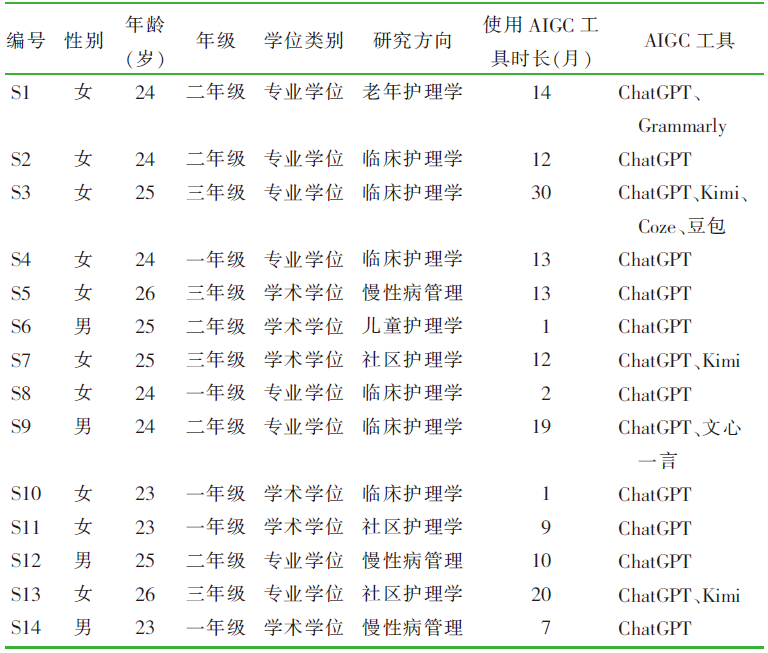| [1] |
中国信息通信研究院,京东探索研究院. 人工智能生成内容(AIGC)白皮书[EB/OL]. (2022-09-02)[2024-03-22]. http://www.caict.ac.cn/sytj/202209/P020220913580752910299.pdf.
|
| [2] |
李白杨, 白云, 詹希旎, 等. 人工智能生成内容(AIGC)的技术特征与形态演进[J]. 图书情报知识, 2023, 40(1):66-74.
|
| [3] |
Labrague LJ, Aguilar-Rosales R, Yboa BC, et al. Factors influencing student nurses’ readiness to adopt artificial intelligence(AI) in their studies and their perceived barriers to accessing AI technology:a cross-sectional study[J]. Nurse Educ Today, 2023,130:105945.
|
| [4] |
骆飞, 马雨璇. 人工智能生成内容对学术生态的影响与应对——基于ChatGPT的讨论与分析[J]. 现代教育技术, 2023, 33(6):15-25.
|
| [5] |
淮盼盼, 李钥, 杨辉. ChatGPT在护理教育中的应用状况及优劣分析[J]. 护理学杂志, 2023, 38(21):117-121.
|
|
Li Y, Huai PP, Yang H. Application of ChatGPT in nursing education and its advantages and disadvantages:a review[J]. J Nurs Sci, 2023, 38(21):117-121.
|
| [6] |
季梦婷, 杨艳. 描述性质性研究方法学的综述[J]. 解放军护理杂志, 2018, 35(11):32-35.
|
| [7] |
杨琳, 杨志英, 阮洪. 质性研究报告标准介绍及思考[J]. 护理学杂志, 2019, 34(14):105-108.
|
| [8] |
Holden RJ, Karsh BT. The technology acceptance model:its past and its future in health care[J]. J Biomed Inform, 2010, 43(1):159-172.
|
| [9] |
Braun V, Clarke V. Using thematic analysis in psychology[J]. Qual Res Psychol, 2006, 3(2):77-101.
|
| [10] |
Sallam M, Salim NA, Barakat M, et al. Assessing health students’ attitudes and usage of ChatGPT in Jordan:validation study[J]. JMIR Med Educ, 2023,9:e48254.
|
| [11] |
Boscardin CK, Gin B, Golde PB, et al. ChatGPT and generative artificial intelligence for medical education:potential impact and opportunity[J]. Acad Med, 2024, 99(1):22-27.
|
| [12] |
祝智庭, 戴岭, 胡姣. 高意识生成式学习:AIGC技术赋能的学习范式创新[J]. 电化教育研究, 2023, 44(6):5-14.
|
|
Zhu ZT, Dai L, Hu J. Higher consciousness generative learning:innovation of learning paradigm enabled by AIGC technology[J]. E Educ Res, 2023, 44(6):5-14.
|
| [13] |
邢瑶, 王帆, 李雯洁. AIGC环境下研究生复杂认知的生成演变——基于ChatGPT的“证据推理”[J]. 现代教育技术, 2024, 34(4):47-59.
|
| [14] |
Yang XW, Ding JJ, Chen HB, et al. Factors affecting the use of artificial intelligence generated content by subject librarians:a qualitative study[J]. Heliyon, 2024, 10(8):e29584.
|
| [15] |
Tam W, Huynh T, Tang A, et al. Nursing education in the age of artificial intelligence powered Chatbots(AI-Chatbots):are we ready yet[J]. Nurse Educ Today, 2023,129:105917.
|
| [16] |
郭彩霞, 郭彩旭, 史晓宁, 等. ChatGPT 赋能护理实践:前景、风险及对策[J]. 协和医学杂志, 2023, 14(6):1170-1174.
|
|
Guo CX, Guo CX, Shi XN, et al. ChatGPT empowered nursing practice:prospects,risks and countermeasures[J]. Med J Peking Union Med Coll Hosp, 2023, 14(6):1170-1174.
|
| [17] |
Sallam M, Salim NA, Barakat M, et al. ChatGPT applications in medical,dental,pharmacy,and public health education:a descriptive study highlighting the advantages and limitations[J]. Narra J, 2023, 3(1):e103.
doi: 10.52225/narra.v3i1.103
pmid: 38450035
|
| [18] |
Sallam M. ChatGPT utility in healthcare education,research,and practice:systematic review on the promising perspectives and valid concerns[J]. Healthcare, 2023, 11(6):887.
|
| [19] |
Hodges AL, Konicki AJ, Talley MH, et al. Competency-based education in transitioning nurse practitioner students from education into practice[J]. J Am Assoc Nurse Pract, 2019, 31(11):675-682.
doi: 10.1097/JXX.0000000000000327
pmid: 31584507
|


